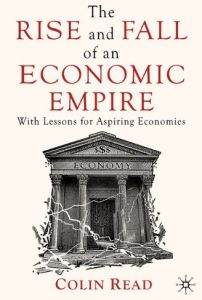Join getAbstract to access the summary!

Join getAbstract to access the summary!
Colin Read
The Rise and Fall of an Economic Empire
With Lessons for Aspiring Economies
Palgrave Macmillan, 2010
What's inside?
Economic empires sow the seeds of their own destruction.
Recommendation
Economic empires, like their political or military counterparts, tend to sow the seeds of their own destruction once they’ve reached their peaks. From those lofty heights, arrogance, changing consumption patterns, altered social expectations and, ultimately, a reversion to government to keep the financial engine going, all foretell an inevitable decline. So says Colin Read, an economics professor at the State University of New York, in his ambitious treatise on economic empires. He offers a thorough, if disordered, trip through economic history, while critiquing the problems of global empire. Though his text is challenging in its density and breadth but short on solutions, it is a solid introduction for students of economic history. getAbstract recommends this book mostly for an academic audience who believes that those who ignore history are doomed to repeat it.
Summary
About the Author
Colin Read is an economics professor at the State University of New York College at Plattsburgh


















Comment on this summary